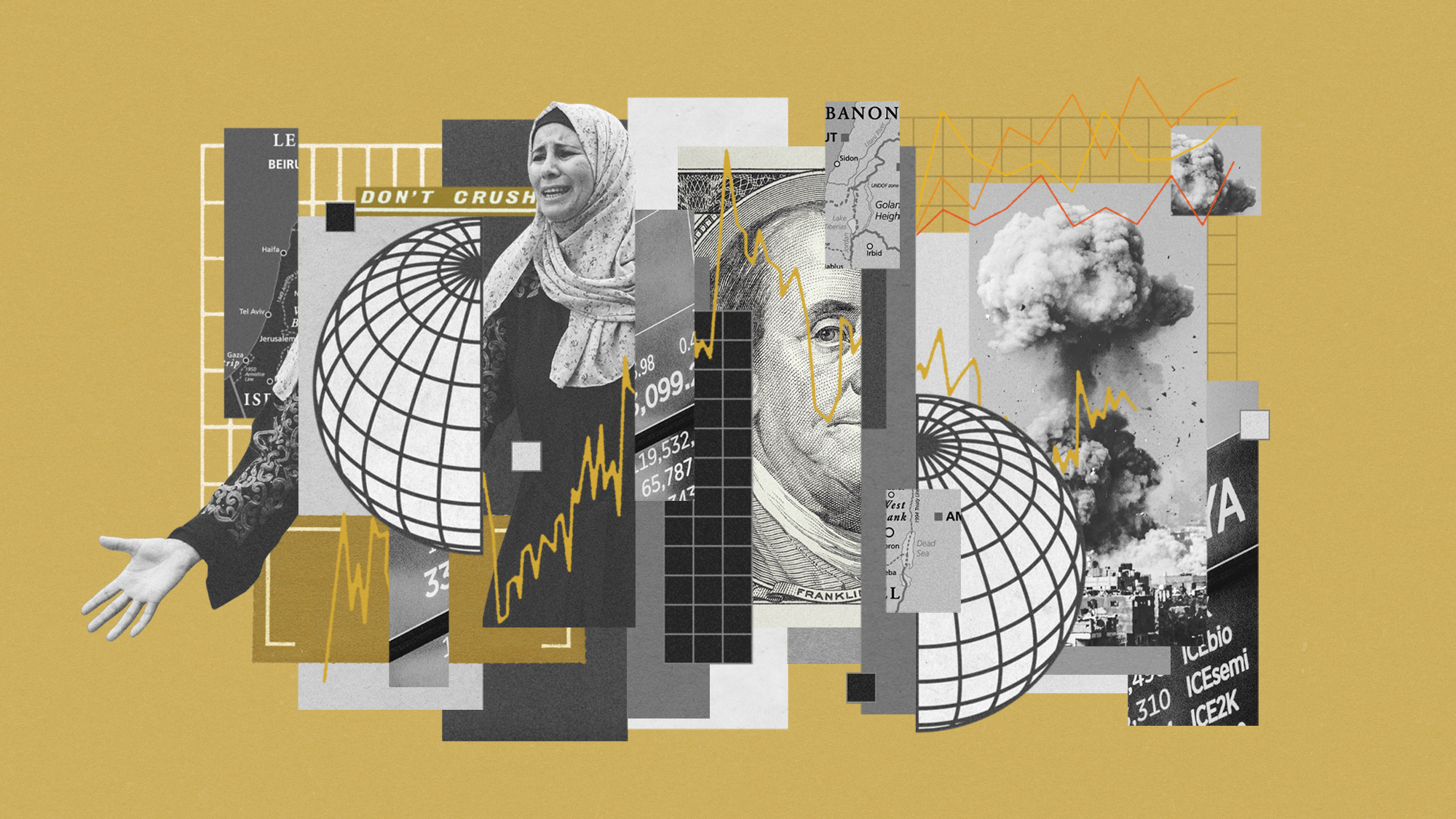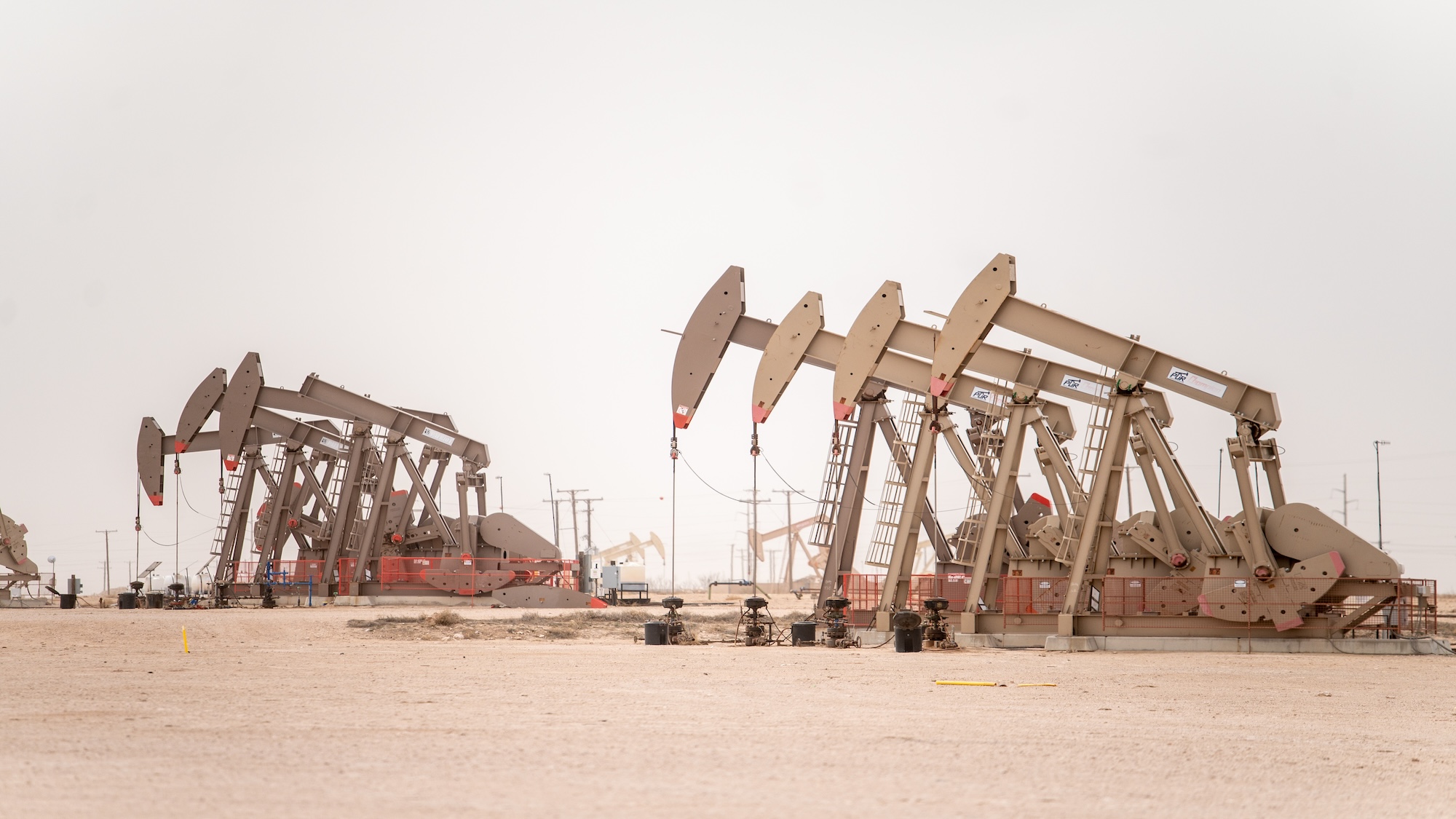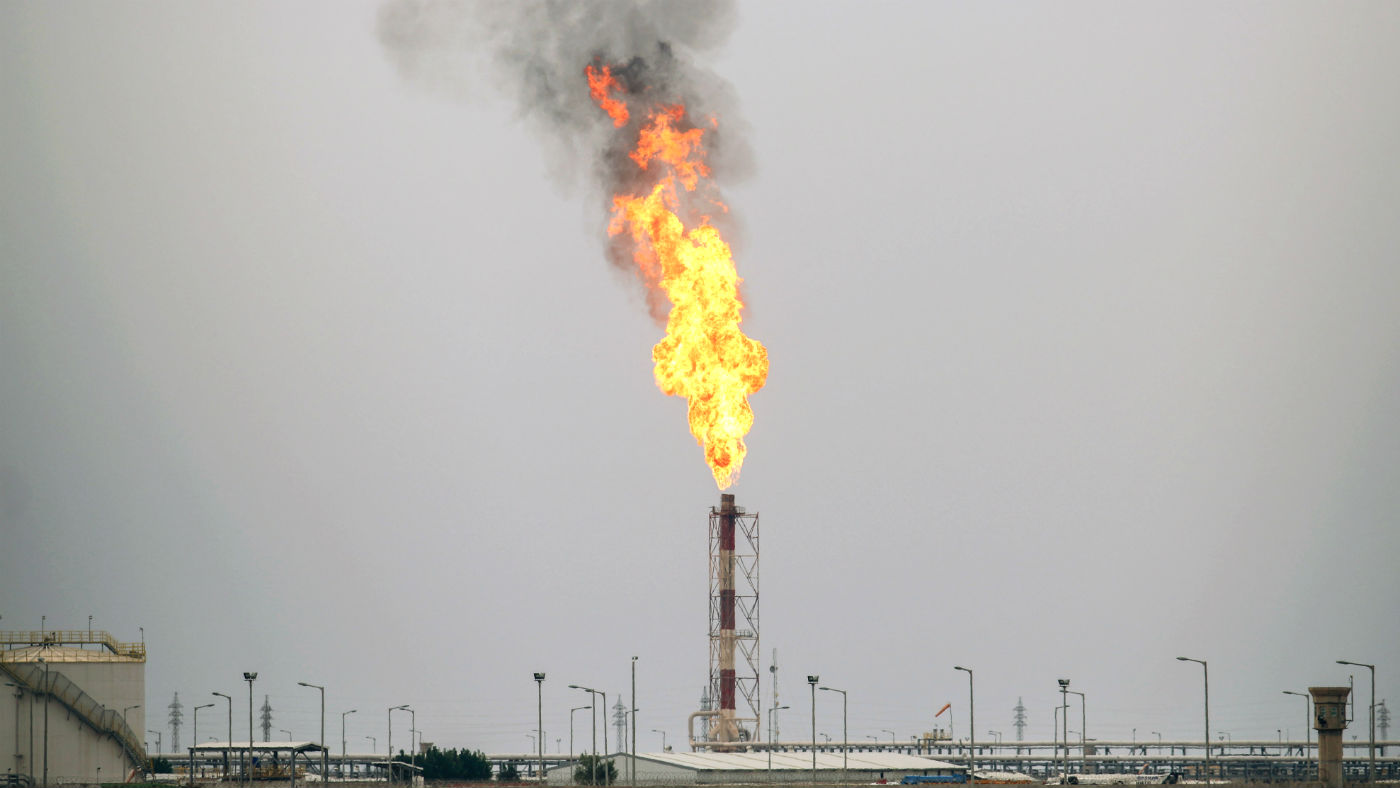Oil price posts two-year highs - but how long can it last?
Brent rose above $59 a barrel this week, its best third-quarter showing since 2004

A free daily email with the biggest news stories of the day – and the best features from TheWeek.com
You are now subscribed
Your newsletter sign-up was successful
Oil price could be in 'reverse Goldilocks' price trap
15 June
Oil dipped lower by the close in New York yesterday, marking the fourth consecutive session of modest losses.
Having hit a near 13-year low of $27 a barrel in early February, international benchmark Brent crude enjoyed a strong rally to around $50 by last month. A second leg of its upward move driven by supply outages in Canada, Nigeria and elsewhere sent it to a new high of $53 last week.
The Week
Escape your echo chamber. Get the facts behind the news, plus analysis from multiple perspectives.

Sign up for The Week's Free Newsletters
From our morning news briefing to a weekly Good News Newsletter, get the best of The Week delivered directly to your inbox.
From our morning news briefing to a weekly Good News Newsletter, get the best of The Week delivered directly to your inbox.
Reuters reports the latest fall came after a private sector report forecast a shock 1.2 million barrel gain in US stockpiles last week.
This would defy analyst predictions for a 2.3 million barrel draw and signals the end of domestic demand balance brought about by the hit to Canadian output in particular. Official figures from the US Energy Information Administration will be published today.
Pipeline disruptions are widely seen as eroding the hefty global oversupply of the last two years that is dragging prices lower.
However, production from the likes of Saudi Arabia and Russia remain near record highs, Iran is returning to the market faster than expected and Canadian exports are coming back online all-too-rapidly for comfort for oil bulls.
A free daily email with the biggest news stories of the day – and the best features from TheWeek.com
"It goes along with all the uncertainty in the market right now," Carl Larry, the director of business development for oil and gas at Frost & Sullivan, said. "Nothing is solid."
Oil futures are also being hit by the upcoming EU referendum. A vote to Leave would likely send the dollar higher and could trigger a demand-dampening recession across Europe.
Longer-term, there are those who say the current narrow price band around $50 represents a price trap from which the market cannot break out.
"It's 'reverse Goldilocks' – it's not hot enough and it's not cold enough… it's not low enough for the bears and it's not high enough for the bulls. Ergo, [$50] is the one number you don't stick at," Paul Horsnell, the head of commodities research at Standard Chartered, said.
Oil price back below $50 and at an 'inflexion point'
14 June
It seems analysts were right to predict that the oil price rally would run out of steam not far north of $50 a barrel.
After dipping back below $50 a barrel on Monday, having been as high as $53 a barrel last week, global prices for crude were in the red again this morning. Brent was down 1.4 per cent to $49.67 and US benchmark West Texas Intermediate fell 1.5 per cent to $48.15.
It also comes in spite of the confirmation that sabotage attacks by rebels in Nigeria had dragged back the countries overall production by around 100,000 barrels per day in May, according to Reuters.
Traders instead focused on the fact that the Opec report failed to lift the forecast for global demand growth, says City AM, while the IEA update explicitly warned over the huge supply overhang remaining in the market that will take some time to work through.
"There is an enormous inventory overhang to clear," the energy agency said, reports the Daily Mail. "This is likely to dampen prospects of a significant in oil prices."
Traders appear to believe the best of the rally is done for now and have cut their long positions, so are no longer betting on rising prices. Official broker forecasts have consistently shown that the market expects prices to be stuck around $50 until at least next year.
Adding to the bearish case is a recent rise in the dollar, which could be spurred further if there is a vote for Brexit at the EU referendum this month. A higher dollar makes oil more expensive for overseas buyers and is likely to curb demand.
Michael Tran, the director of energy strategy at RBC Capital Markets in New York, said the oil price is at a "bit of an inflection point… right now" and that "geopolitics will likely get worse before they get better".
Oil price falls below $50 as economic concerns rise
13 June
Oil prices fell this morning as Asian stock markets hit two-month lows in a downturn prompted by worries about the global economy and uncertainty over the UK's future in Europe.
Brent crude oil futures slipped below $50 per barrel, hitting $49.89, down 65 cents or 1.29 per cent, at 6:44 GMT before rallying to $50.07 by 10:00 GMT.
West Texas Intermediate was down 54 cents, or more than 1.2 per cent, at $48.50 a barrel.
"A strong dollar is helping bring prices down as well as fairly weak data from Asia," Matt Stanley of brokerage Freight Investor Services told Reuters.
Oil prices have been rising after hitting ten-year lows in February, largely due to "unplanned production outages world-wide and falling output in the US", MarketWatch says.
Japan's spluttering economy and worries about growth in China, "largely due to industrial overcapacity and spiralling debt", have led analysts to predict oil prices will rise no higher than their current levels.
Still, some traders expect Asian demand to remain high.
"Against the backdrop of low international oil prices, Chinese crude oil demand will remain well supported this year as demand continues to gain traction from stockpiling activities and refining use," energy consultancy FGE said.
"We expect Chinese crude oil imports to grow by 730,000-760,000 barrels per day this year," it added.
Oil price struggles will cost 120,000 UK jobs
10 June
Ongoing weakness in the oil price will cause the loss of as many as 40,000 jobs this year, claims the oil and gas trade body.
A new report from Oil & Gas UK says 84,000 jobs were lost in the sector in 2015 and that by the end of this year, total employment could fall to 330,000 - a drop of 120,000 since its peak of 450,000 in 2014.
"The industry has been spending more than it is earning since the oil price slump towards the end of 2014," chief executive Deirdre Michie told the Daily Mail. "This is not sustainable and companies have been faced with some very difficult decisions."
International benchmark Brent crude, which sets the price for North Sea oil, has been recovering since hitting near 13-year lows of $27 a barrel in February. It peaked at around $53 this week, but dipped back to a little more than $51 in London this morning.
Despite this, Oil & Gas UK's report says the cost of producing a barrel remains higher than the oil price at one in five North Sea drilling fields.
There have been hopes that the rise back above the psychologically important $50 threshold would trigger a more sustained price surge.
But for every analyst stating $50 is a new price floor, there is another predicting that prices will remain stuck at this level and could even fall in the short to medium term. Consensus forecasts have oil at less than $60 a barrel by the end of 2017.
Emphasising this skittish view, the price slipped overnight after a three-day rally amid ongoing fears of another supply glut caused by the lack of a cap on Middle East production and a rebound in Canada following recent outages.
US stockpiles declined for the third consecutive week last week, but the drawdown was smaller for the second week in a row. A rebound for the dollar, which raises overseas costs, also hit sentiment.
Oil price slump to keep sector 'in doldrums until 2018'
09 June
The oil industry faces two more years of woe thanks to excess supply from Saudi Arabia and Iraq that will keep barrel prices at low levels, says BP's chief economist.
Spencer Dale says the global glut of oil could take up to 18 months to decline, holding prices down and heaping yet more pressure on Britain’s North Sea oil industry.
This excess stock is the biggest in the history of the oil industry. Dale’s 18-month timescale means there is little prospect of a swift recovery in prices to the levels above $100 a barrel recorded two years ago.
Oil hit its highest price in eight months yesterday, rising for a third consecutive day to more than $53 a barrel at one point. This is still a far cry from June 2014, when it stood at $114.
It inched up further today: in New York, US benchmark West Texas Intermediate was trading at $51.59 a barrel, up $0.36, or 0.7 per cent, while August Brent crude on London’s ICE Futures exchange rose 25 cents, or 0.5 per cent, to $52.75 a barrel.
While the recent recovery has seen some call a new bottom for prices, other analysts believe the supply glut will keep prices rooted around $50 – and could see them fall again in the months ahead, especially if the rebound prompts renewed drilling in the US.
Yesterday, BP's rival Shell issued a trading update in which it warned of further investment cuts as it prepares for a "lower forever" oil price environment.
Reuters said production rose by 3.2 per cent last year to 91.67m barrels per day, driven by increased output from US shale oil and Iraq and Saudi Arabia increasing production to record levels.
"This is truly the age of plenty," concludes Dale.
-
 Why is the Trump administration talking about ‘Western civilization’?
Why is the Trump administration talking about ‘Western civilization’?Talking Points Rubio says Europe, US bonded by religion and ancestry
-
 Quentin Deranque: a student’s death energizes the French far right
Quentin Deranque: a student’s death energizes the French far rightIN THE SPOTLIGHT Reactions to the violent killing of an ultraconservative activist offer a glimpse at the culture wars roiling France ahead of next year’s elections
-
 Secured vs. unsecured loans: how do they differ and which is better?
Secured vs. unsecured loans: how do they differ and which is better?the explainer They are distinguished by the level of risk and the inclusion of collateral
-
 How might the Israel-Hamas war affect the global economy?
How might the Israel-Hamas war affect the global economy?Today's Big Question Regional escalation could send oil prices and inflation sky-high, sparking a worldwide recession
-
 Recent mega-mergers could signal a turning point for the US oil industry
Recent mega-mergers could signal a turning point for the US oil industryTalking Point Both Chevron and Exxon have recently spent billions to acquire smaller oil companies
-
 Has Saudi Arabia lost control of oil prices?
Has Saudi Arabia lost control of oil prices?Today's Big Question Kingdom goes it alone to cut production, risking tension with US and reigniting cooling inflation in Europe
-
 US angered by Opec+ oil cut
US angered by Opec+ oil cutSpeed Read Energy prices to rise further as producers slash supply by two million barrels a day
-
 Global oil demand forecast lowered for 2020 and 2021
Global oil demand forecast lowered for 2020 and 2021Speed Read IEA report says jet fuel demand remains the major source of weakness
-
 Are US-Iran tensions flaring again?
Are US-Iran tensions flaring again?In Depth Trump threatens military action over Twitter
-
 Can a deal be struck to raise oil prices?
Can a deal be struck to raise oil prices?In Depth Opec+ will convene today over video link in a bid to boost crude
-
 What do negative oil prices mean?
What do negative oil prices mean?In Depth Perfect storm of oversupply and storage shortages sees producers paying to get rid of US crude